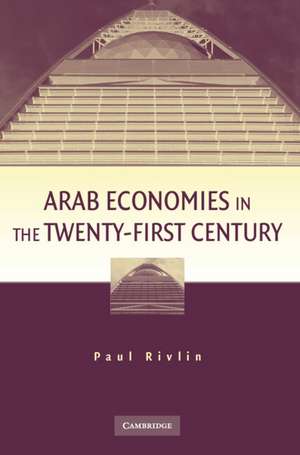Arab Economies in the Twenty-First Century
Autor Paul Rivlinen Limba Engleză Hardback – 8 feb 2009
Preț: 499.70 lei
Preț vechi: 561.46 lei
-11% Nou
Puncte Express: 750
Preț estimativ în valută:
95.62€ • 102.25$ • 79.72£
95.62€ • 102.25$ • 79.72£
Carte tipărită la comandă
Livrare economică 18 aprilie-02 mai
Preluare comenzi: 021 569.72.76
Specificații
ISBN-13: 9780521895002
ISBN-10: 0521895006
Pagini: 328
Ilustrații: 32 b/w illus. 62 tables
Dimensiuni: 159 x 236 x 23 mm
Greutate: 0.54 kg
Ediția:1
Editura: Cambridge University Press
Colecția Cambridge University Press
Locul publicării:New York, United States
ISBN-10: 0521895006
Pagini: 328
Ilustrații: 32 b/w illus. 62 tables
Dimensiuni: 159 x 236 x 23 mm
Greutate: 0.54 kg
Ediția:1
Editura: Cambridge University Press
Colecția Cambridge University Press
Locul publicării:New York, United States
Cuprins
1. Introduction; 2. Demography and economics; 3. The constraints of history; 4. Comparative economics: the Arab world, East Asia and South America; 5. Egypt: the submerged giant?; 6. Iraq: after destruction; 7. Jordan: from rents to market?; 8. Morocco: reforms that did not cure; 9. Palestine: the making and unmaking of a state; 10. Saudi Arabia: oil wealth and unemployment; 11. Syria: lost potential; 12. Tunisia: unhappy leader; 13. Conclusions: the Arab equilibrium.
Recenzii
'Rivlin's analysis of the Arab economies is the most thorough and astute available today, offering exceptional insights into the interactions of history, politics, and economics across the region. Rivlin focuses our attention on how the Arab world has squandered the 'demographic gift' of a rapidly growing work force and shrinking portion of dependents. He shows how political conservatism has not only been supported by oil revenues and remittances, it has blocked the reforms needed to promote modern education and rapid industrialization. As a result, rapid labor force growth has not been a source of rising productivity, but of rising unemployment, political restiveness, and radicalism.' Jack A. Goldstone, George Mason University
'Rivlin's book is a must-read for anyone seeking to understand the causes and consequences of the poor economic performance of the Arab economies. It presents a coherent and comprehensive analysis of the economic, social, and political factors that hinder economic development and prevent political changes in this important part of the world.' Avner Greif, Stanford University
'Once home to major commercial centers, the Arab world is now a minor player in the world economy. In this nicely crafted book, Paul Rivlin lays out the relevant facts and figures with close attention to variations across countries. He also offers a bold interpretation that centers on institutions, demographic trends, and constraints rooted in religion. The research is imaginative and the synthesis both original and provocative.' Timur Kuran, Duke University
'Rivlin skillfully addresses in comparative context the vital issue of how Arab political economies are dealing with their 'youth bulge.' His investigation of their failure adequately to capitalize on this potential human resource asset sheds valuable new light on both this specific topic and the more general one of Arab economic development.' Robert Springborg, Naval Postgraduate School, Monterey
'Rivlin's book is a must-read for anyone seeking to understand the causes and consequences of the poor economic performance of the Arab economies. It presents a coherent and comprehensive analysis of the economic, social, and political factors that hinder economic development and prevent political changes in this important part of the world.' Avner Greif, Stanford University
'Once home to major commercial centers, the Arab world is now a minor player in the world economy. In this nicely crafted book, Paul Rivlin lays out the relevant facts and figures with close attention to variations across countries. He also offers a bold interpretation that centers on institutions, demographic trends, and constraints rooted in religion. The research is imaginative and the synthesis both original and provocative.' Timur Kuran, Duke University
'Rivlin skillfully addresses in comparative context the vital issue of how Arab political economies are dealing with their 'youth bulge.' His investigation of their failure adequately to capitalize on this potential human resource asset sheds valuable new light on both this specific topic and the more general one of Arab economic development.' Robert Springborg, Naval Postgraduate School, Monterey
Notă biografică
Descriere
This book examines the relationship between demographic growth and economic development in eight Arab countries.
